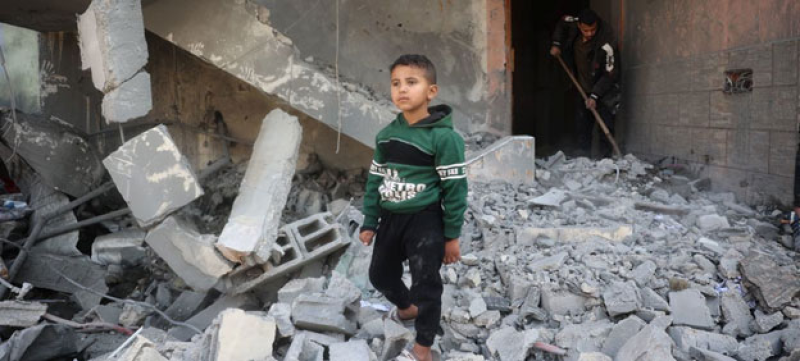- Shahidul Alam Vows to Reach Gaza Despite Israeli Obstacles |
- UN Urged to Act on Palestinian Rights Without Delay |
- Saudi Arabia Introduces New Licensing for Hajj Accommodations |
- UK Pledges Aid to Support Rohingya Refugees and Host Communities |
- Investors and Officials Challenge Elon Musk’s $1 Trillion Pay |
US Role Criticized Amid Escalating Israel-Gaza Crisis

A young boy walks through the rubble of his home in Al Nusirat, Gaza, September 2025.
As a world leader and beneficiary of the international system, the United States should be at the forefront of enforcing rules and laws to prevent the proliferation of weapons of mass destruction, protect civilians in conflict, and block weapons transfers to states engaging in war crimes or genocide.
Since the October 7, 2023, terrorist attack by Hamas, the Israeli military has killed more than 66,000 Palestinians and wounded over 168,000 in its two-year bombing campaign in Gaza. Many thousands more are dying from starvation and disease. The campaign is widely considered disproportionate and illegal under international law.
There is overwhelming evidence that U.S. weapons, along with those from other states, have been used by the Netanyahu government in its war on Gaza in violation of humanitarian law, and that Israel has blocked humanitarian assistance from the U.S., other nations, and nongovernmental aid groups.
In the name of defeating Hamas, the Israeli government—using U.S.-supplied weapons and ammunition—has systematically bombed population centers, including schools, hospitals, water and sanitation infrastructure, and aid workers, and has forcibly displaced hundreds of thousands of civilians.
Yet President Donald Trump, his successor Joe Biden, and the majority of Congress have failed to uphold U.S. and international law. They have refused to use their leverage to withhold military aid from Israel to protect innocent lives, facilitate a ceasefire, and secure the release of surviving Israeli hostages.
As a result, the United States is complicit in one of the most horrific chapters in modern history, and its reputation as a defender of the international rules-based system is in tatters.
In July, B’Tselem—the independent Israeli Information Center for Human Rights in the Occupied Territories—released a report finding that “for nearly two years, Israel has been committing genocide against Palestinians in the Gaza Strip.” UN world hunger experts also warned that the besieged civilian population in Gaza was at risk of famine.
A September report from Democratic U.S. Senators Chris Van Hollen of Maryland and Jeff Merkley of Oregon, based on a regional fact-finding trip, concluded: “The Netanyahu government has used a two-pronged strategy—the systematic destruction of civilian infrastructure and the use of food and humanitarian assistance as a weapon of war. The goal is, in effect, to ethnically cleanse Gaza of its Palestinian population.”
The U.S. Foreign Assistance Act—and basic human decency—require withholding military aid when U.S. weapons are used by any government engaging in consistent gross violations of human rights or restricting humanitarian aid delivery.
Despite the war’s devastating toll, the Trump administration accelerated military aid to Israel and reversed earlier Biden restrictions on 2,000-pound bombs, which can have indiscriminate effects in populated areas.
In February, the Trump administration notified Congress of seven major arms sales to Israel, amounting to over $11 billion in lethal weapons. Immediately afterward, Prime Minister Benjamin Netanyahu unilaterally broke the phased ceasefire that had been negotiated with Hamas.
Since then, Israeli violence against civilians in Gaza and the occupied West Bank has escalated, worsening the humanitarian crisis.
Following another arms transfer notice in July, some members of Congress proposed joint resolutions that could have blocked a $675 million weapons transfer to Israel. Despite over 60 percent of Americans opposing further military aid to Israel, the measure won the support of only 24 senators, all Democrats.
In the face of U.S. inaction, Netanyahu defied international calls to end the war, ordered a new offensive against Gaza City, and rejected Palestinian statehood.
It is past time for Congress and other international actors to enforce the most basic rules to protect civilians. UN experts have proposed a “Uniting for Peace” resolution demanding cessation of Israel’s bombardment, release of remaining hostages by Hamas, an arms embargo on both parties, and unfettered delivery of humanitarian aid.
Such resolutions carry legal and political weight and can authorize a UN emergency force when Security Council members fail to maintain international peace. If there has been a time for bolder action, it is now.
Daryl G. Kimball is Executive Director of the Arms Control Association, Washington DC.
The Arms Control Association, founded in 1971, is a national nonpartisan organization dedicated to promoting public understanding of and support for effective arms control policies.

